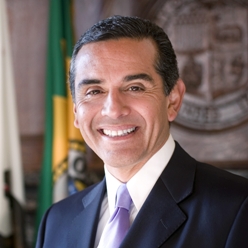As the country awaits President Obama’s jobs plan, to be announced (at a new time!) next Thursday, many are making their own suggestions about how to stimulate job creation. The U.S. Conference of Mayors threw its hat in the ring today, releasing “A Common Sense Jobs Agenda” [PDF] with its full-throated insistence that Congress pass the Senate’s transportation bill.

Although Los Angeles Mayor Antonio Villaraigosa praised House Republicans for their proposal when it was released (mostly just for its healthy boost for the TIFIA loan program), he makes no bones about the fact that it’s the Senate plan he prefers. Villaraigosa is the president of the U.S. Conference of Mayors.
The first plank of the four-step jobs program advocated by the Conference is this: “Invest in infrastructure jobs now. That begins with passing a comprehensive, fully-funded transportation bill.”
For now, they get behind the push for a clean extension without games or demands by either side.
It is a matter of urgent necessity that Congress pass a clean extension of the current Transportation Bill - without policy and funding changes - and extend the gas tax to give Congress time to pass the larger reauthorization bill. If such an extension is not signed by the President by September 30, the entire program will be suspended - causing the loss of 1.8 million jobs and doing irreparable harm to our economy. In this scenario, the Highway Trust Fund will lose $100 million dollars each day and the Trust Fund would completely run out of money early next year.
In addition to TIFIA, the mayors also support the creation of an infrastructure bank, bonding, and other financing tools including the Community Development Block Grant program.
But the transportation bill is the main dish. They demand passage of the EPW Committee’s proposal, which “would maintain current funding levels and create up to 2.8 million jobs across the United States,” as well as super-sizing the TIFIA program up to $1 billion.
The mayors also borrow a position from Sen. Barbara Boxer, asking that war money be diverted to infrastructure as U.S. missions in Iraq and Afghanistan draw down.
A more novel proposal, put forth by the Conference, is to permit transportation agencies to require local hiring and procurement, even when receiving federal transportation dollars, when local funding is paying for a majority of a project’s cost:
Currently, federal procurement rules preclude local government agencies from requiring bidders to establish local hiring or purchasing programs if they receive federal transportation funding. The rationale for this prohibition is that the federal gas tax is collected from around the nation and therefore everyone in the country should have the opportunity to bid on any given project. We propose that we change these regulations to help incentivize localities to raise a greater share of their own revenue for transportation projects. If local taxpayers step up to increase non-federal revenue to pay for more than half of a transportation project’s costs, stretching limited federal dollars further, the locality should be permitted to hire locally and buy goods and services locally in proportion to their local investment.
While many transportation agencies would undoubtedly prefer to keep open bidding to allow for a more competitive process, mayors -- for whom job concerns trump nearly everything else right now -- would like to make sure their own constituents get the jobs created in their cities. That could lead to higher costs for transportation projects, meaning fewer such projects might be realized.
Meanwhile, President Obama’s jobs plan is also expected to include some new revenue for transportation projects, as well as payroll tax cuts and an emergency extension of unemployment benefits. The unemployment rate in August stayed at 9.1 percent.
The White House used the disappointing jobs numbers as an excuse to make another push for a clean extension of the transportation bill. “Today’s report underscores the President’s call for Congress to pass a clean extension of the transportation bill to keep workers on the job and keep critical highway construction, bridge repair, mass transit and other important projects moving forward,” said Katherine Abraham, a member of Obama’s Council of Economic Advisors, in a statement.





